This guide shows you how to use the Google Mobile Ads SDK to load and display ads from Unity Ads using AdMob Mediation, covering waterfall integrations. It covers how to add Unity Ads to an ad unit's mediation configuration, and how to integrate the Unity Ads SDK and adapter into an iOS app.
Supported integrations and ad formats
The mediation adapter for Unity Ads has the following capabilities:
| Integration | |
|---|---|
| Bidding | 1 |
| Waterfall | |
| Formats | |
| Banner | |
| Interstitial | |
| Rewarded | |
| Native | |
1 Bidding integration is in closed beta, reach out to your account manager to request access.
Requirements
iOS deployment target of 12.0 or higher
[For bidding]: To integrate all supported ad formats in bidding, use Unity adapter 4.11.3.1 or higher (latest version recommended)
Latest Google Mobile Ads SDK
Complete the mediation Get started guide
Step 1: Set up configurations in Unity Ads UI
Sign up or log in to Unity Ads.
Create a project
On Unity Ads Dashboard, navigate to Projects and click Create Project.
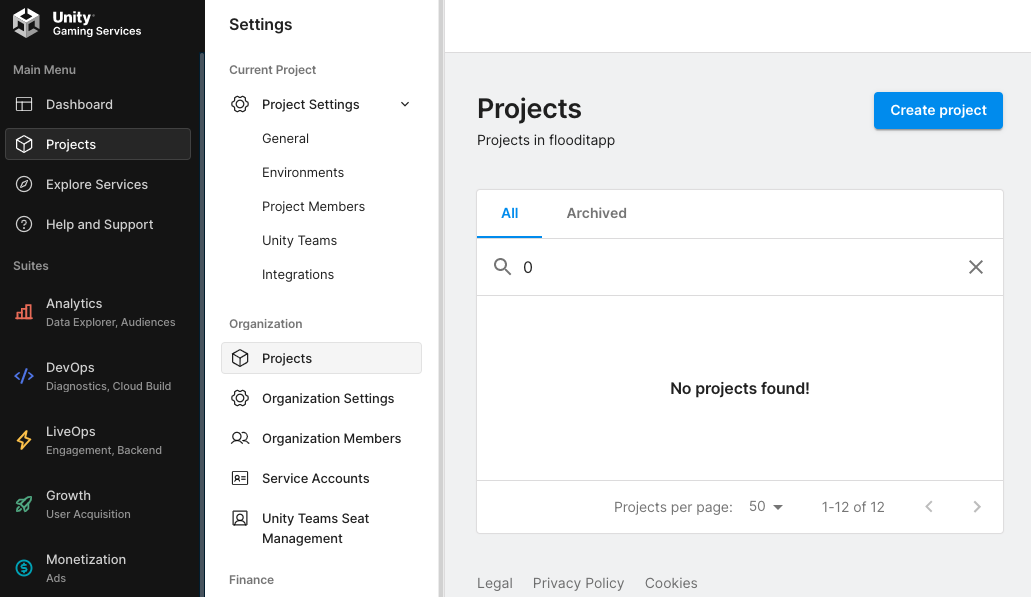
Fill out the form and click Create Project to add your project.

Navigate to Monetization > Get started, then click Get started.
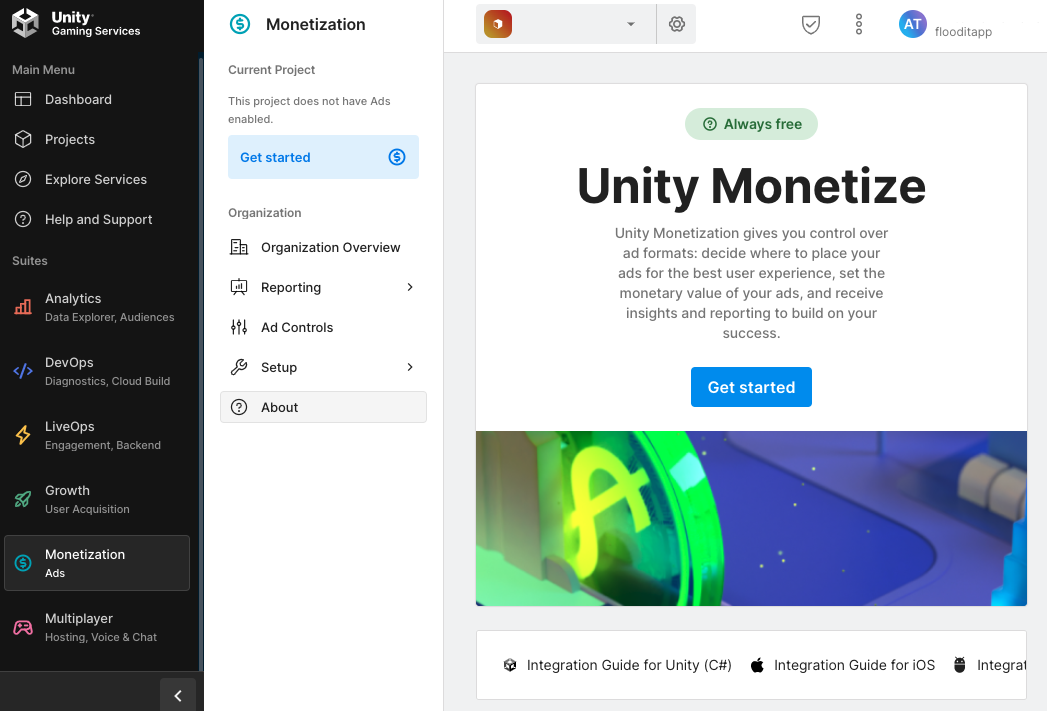
In the Project Setup modal, select I plan to use Mediation and Google Admob for Mediation Partner, then click Next.

Select your ad settings, then click Next.
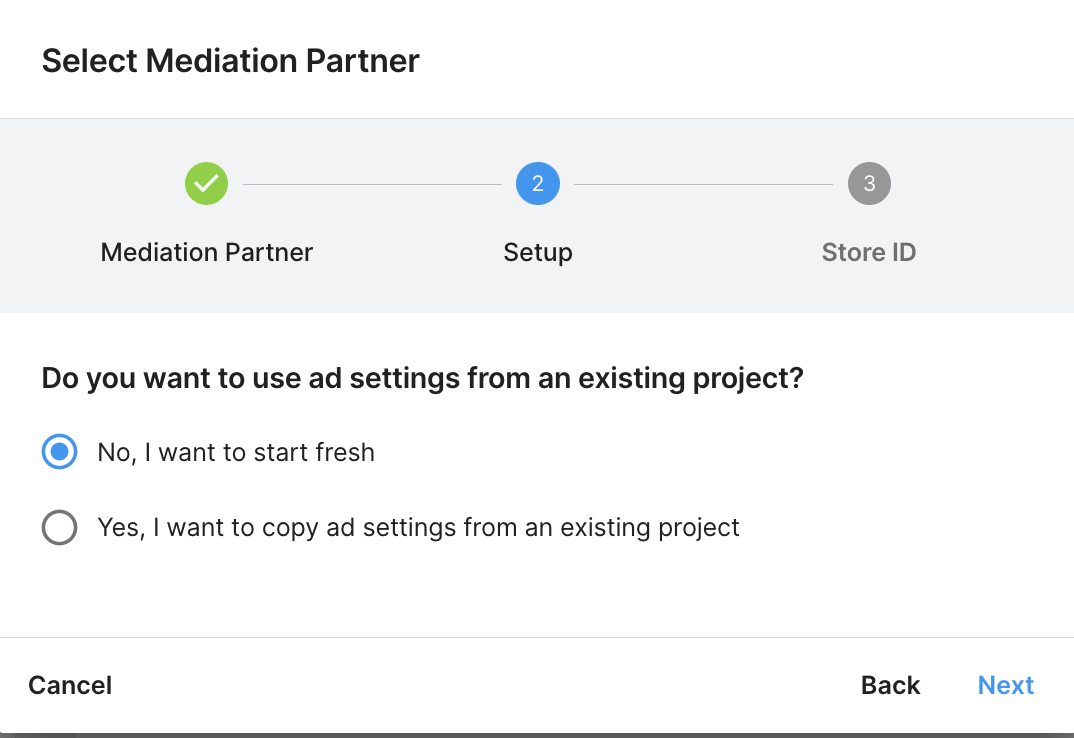
Fill out the form, then click Add Project.
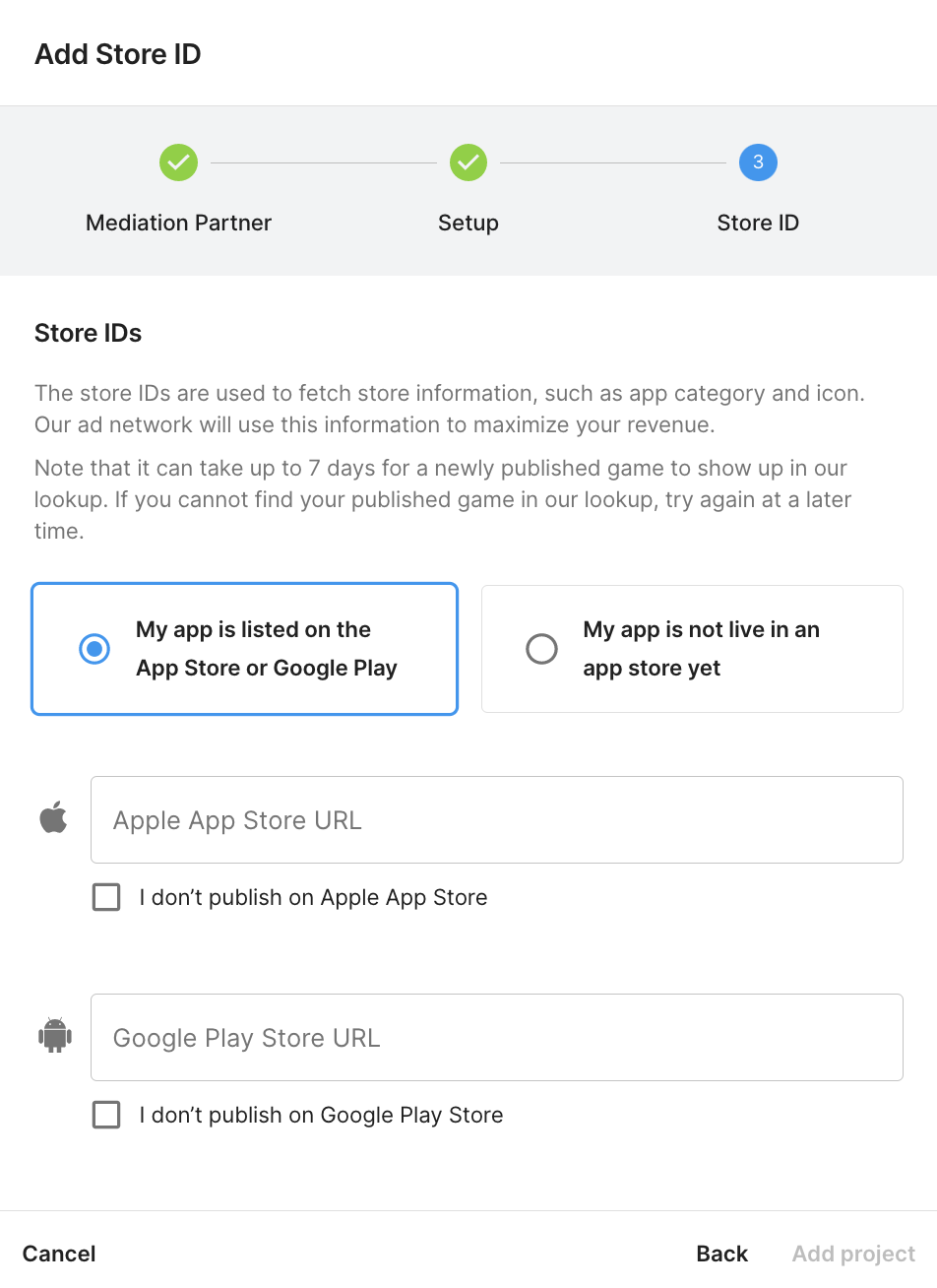
Take note of the Game ID.
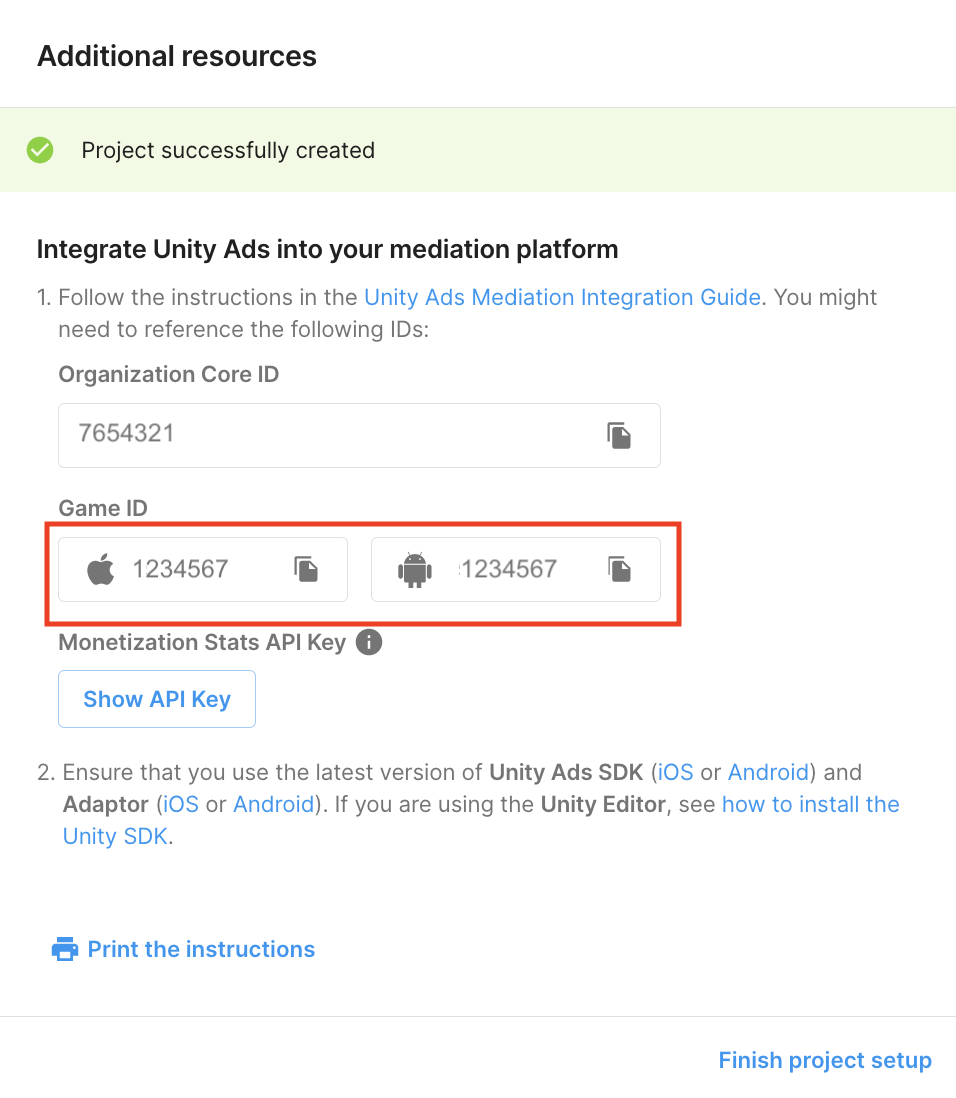
Create an Ad Unit
Navigate to Monetization > Ad Units, then click Add Ad Unit.

Enter an Ad Unit Name, then select your Platform and Ad Format.

Finally, click Create to save your ad unit.
Add a Placement
Bidding
Contact your Google account manager to create bidding placements.
Waterfall
Once the project is created, navigate to Monetization > Placements. To create a new placement, click Add Placement for your ad unit.

Fill out the necessary details and click Add Placement.

Take note of the Placement ID.

Locate Unity Ads Reporting API key
Bidding
This step isn't required for bidding integrations.
Waterfall
In addition to the Game ID and Placement ID, you will also need your Unity Ads API Key and Organization core ID for setting up your AdMob ad unit ID.
Navigate to the Monetization > Setup > API Management and take note of the Monetization Stats API Access Key.
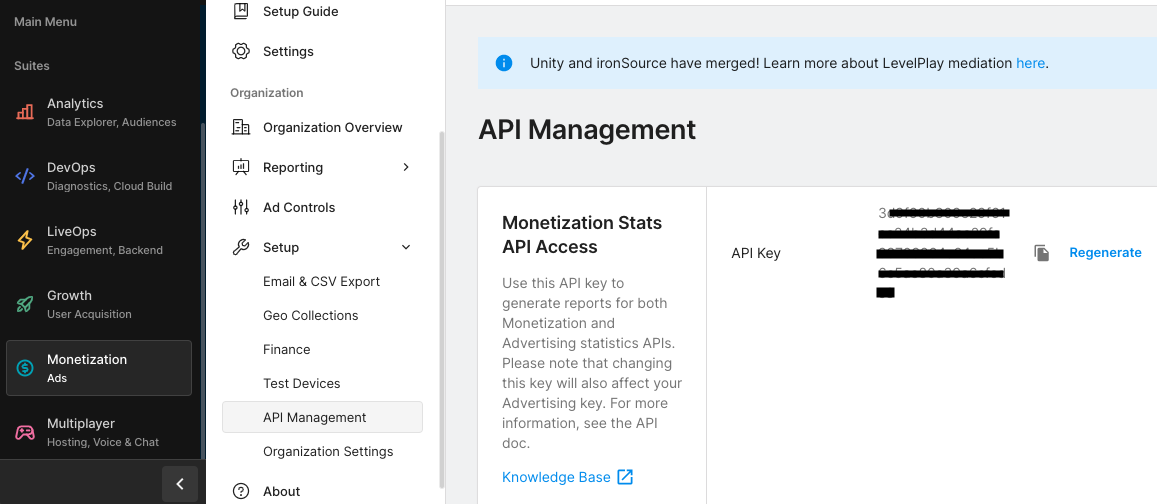
Then, navigate to the Monetization > Organization Settings and take note of the Organization core ID.
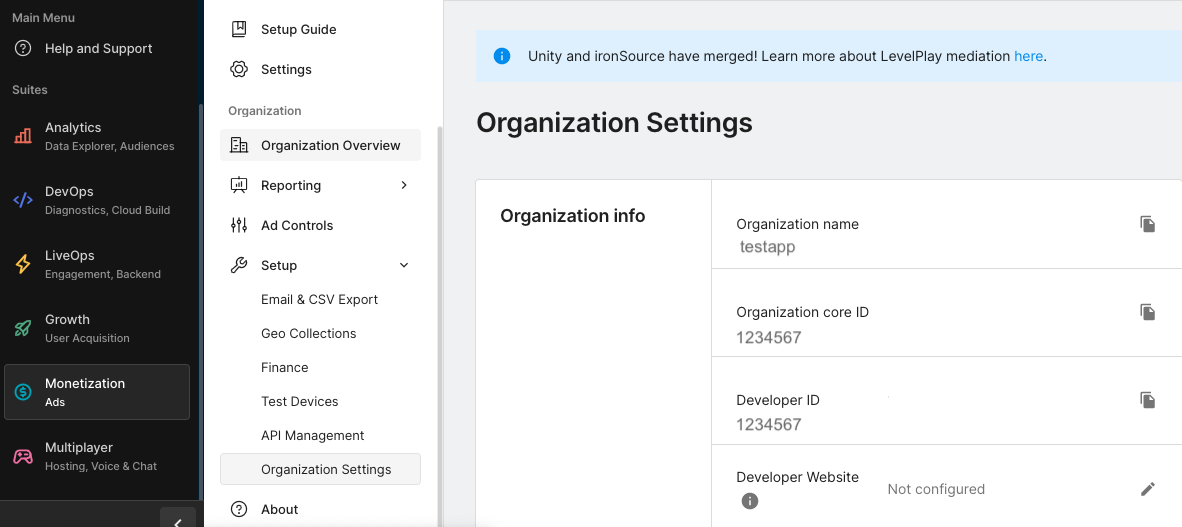
Turn on test mode
Test mode can be enabled from the Unity Ads dashboard. Under your project's settings, select the Testing tab.
You can force test mode for your app by clicking the edit button beside Apple App Store , checking Override client test mode and selecting Force test mode ON (i.e. use test ads) for all devices.

Alternatively, you can enable test mode for specific devices by clicking the Add Test Device button.

Fill out the form and click Save.

Step 2: Set up Unity Ads demand in AdMob UI
Configure mediation settings for your ad unit
You need to add Unity Ads to the mediation configuration for your ad unit.
First, sign in to your AdMob account. Next, navigate to the Mediation tab. If you have an existing mediation group you'd like to modify, click the name of that mediation group to edit it, and skip ahead to Add Unity Ads as an ad source.
To create a new mediation group, select Create Mediation Group.

Enter your ad format and platform, then click Continue.
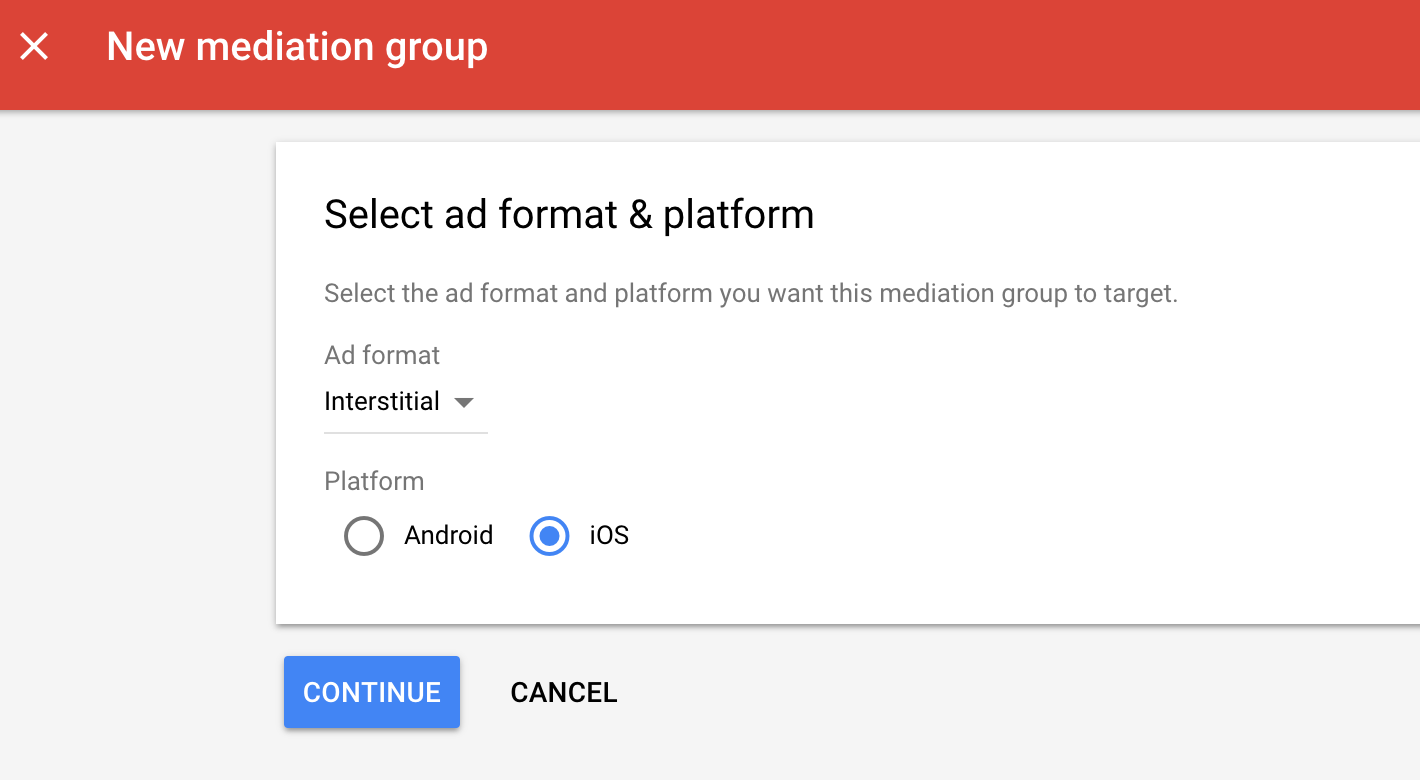
Give your mediation group a name, and select locations to target. Next, set the mediation group status to Enabled, and then click Add Ad Units.
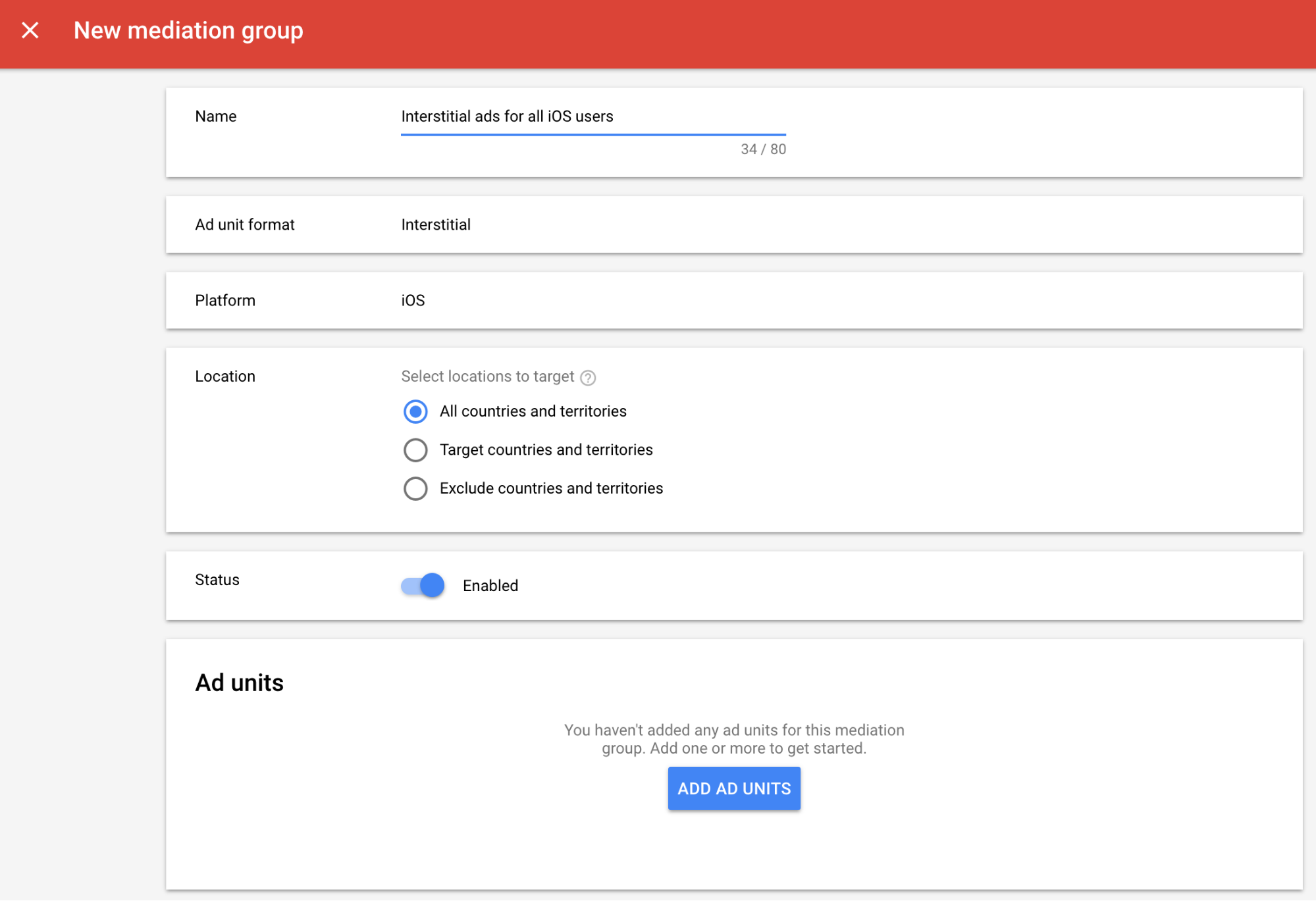
Associate this mediation group with one or more of your existing AdMob ad units. Then click Done.
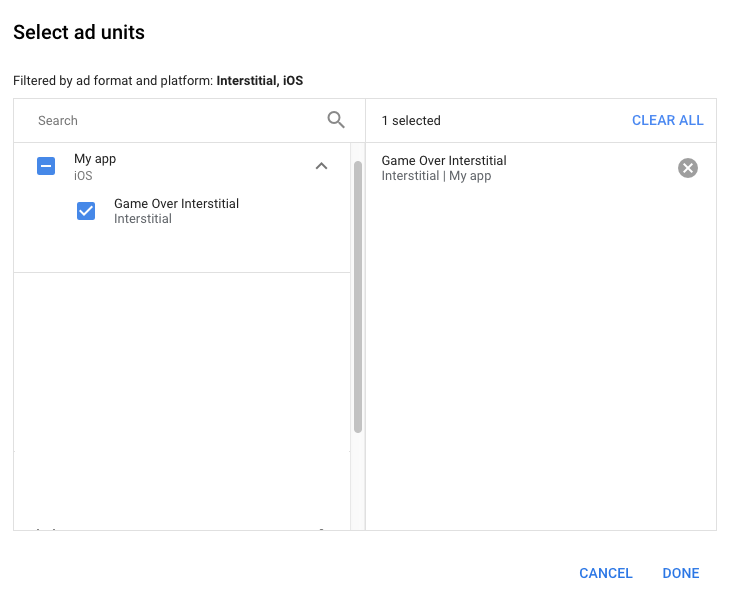
You should now see the ad units card populated with the ad units you selected:
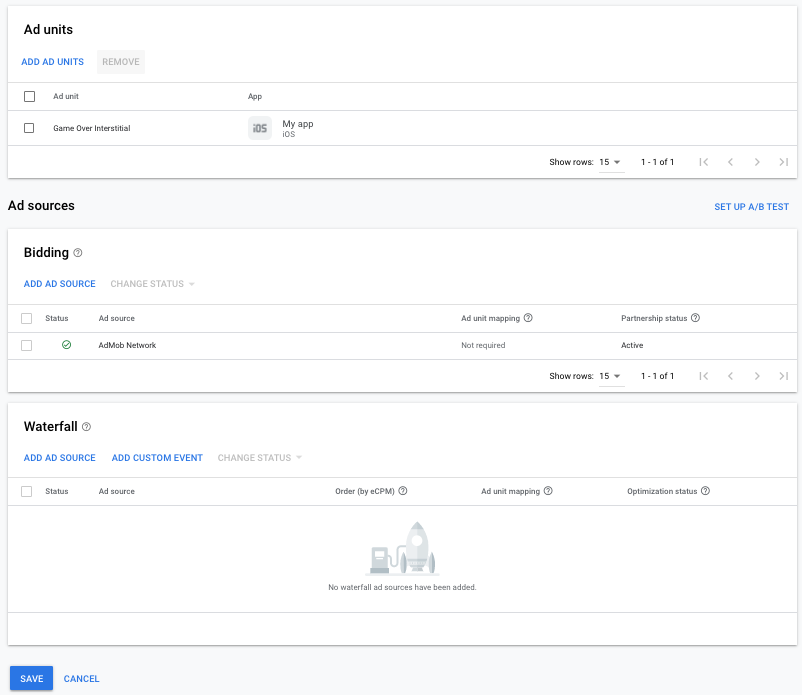
Add Unity Ads as an ad source
Bidding
Under the Bidding card in the Ad Sources section, select Add Ad Source. Then select Unity Ads .
Click How to sign a partnership agreement and set up a bidding partnership with Unity Ads.
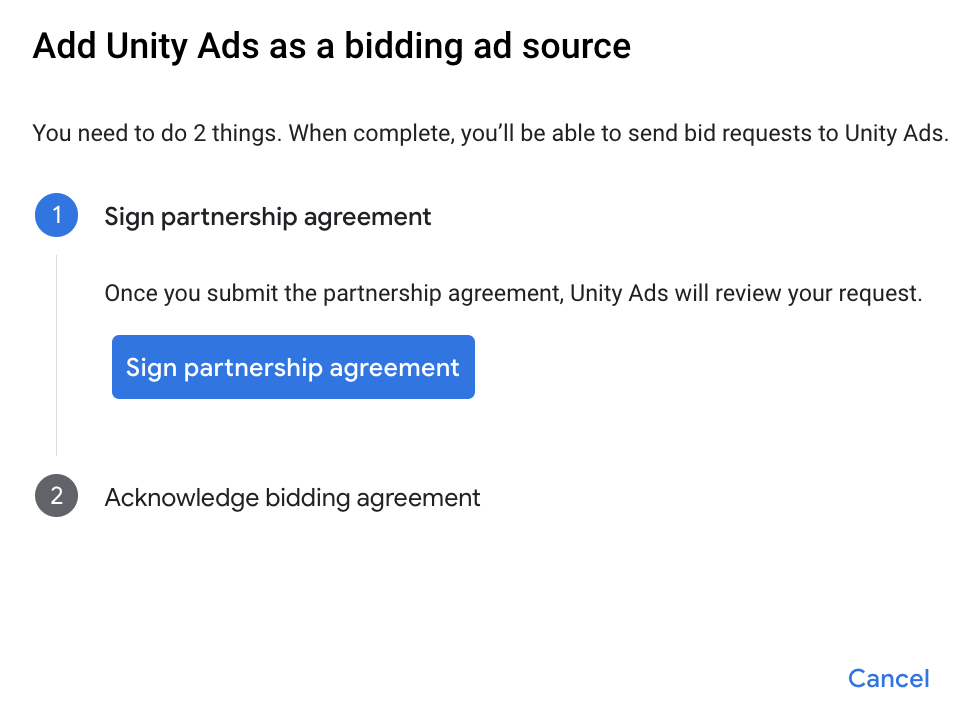
Click Acknowledge & agree, then click Continue.
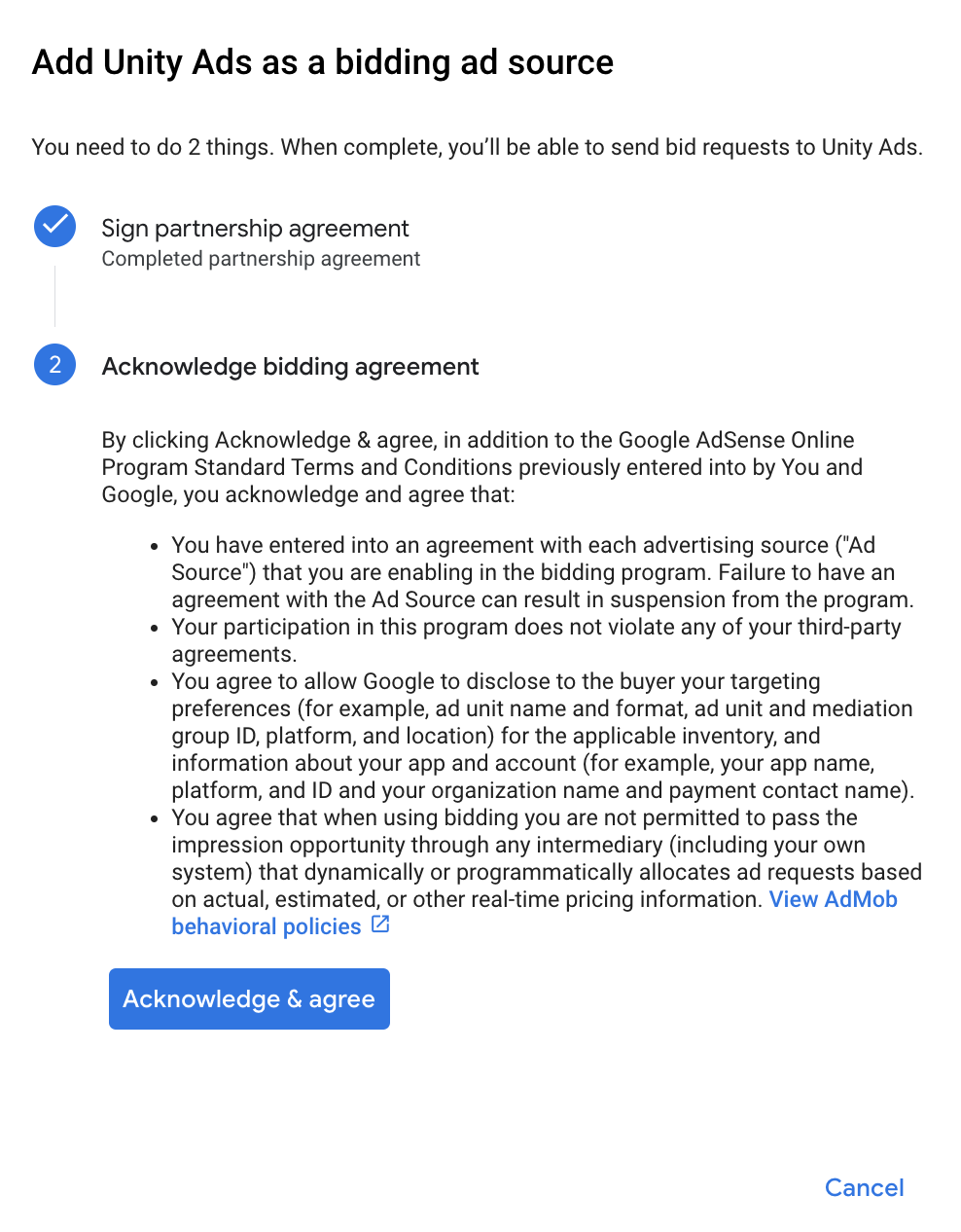
If you already have a mapping for Unity Ads, you can select it. Otherwise, click Add mapping.
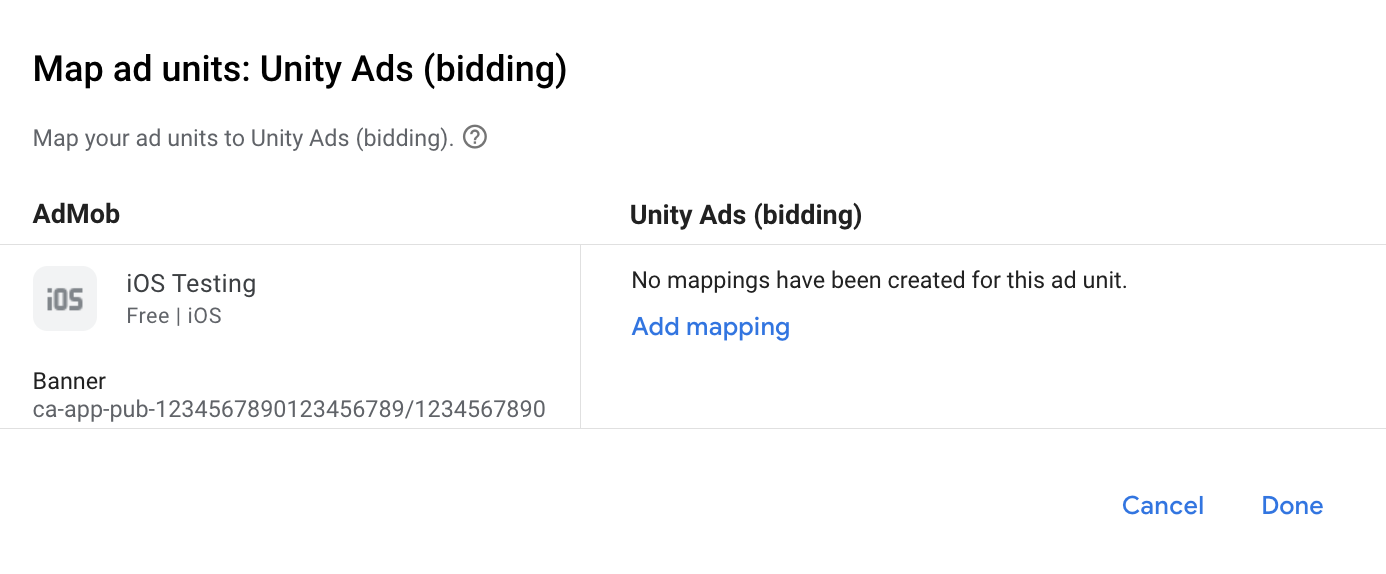
Next, enter the Game ID and Placement ID obtained in the previous section. Then click Done.
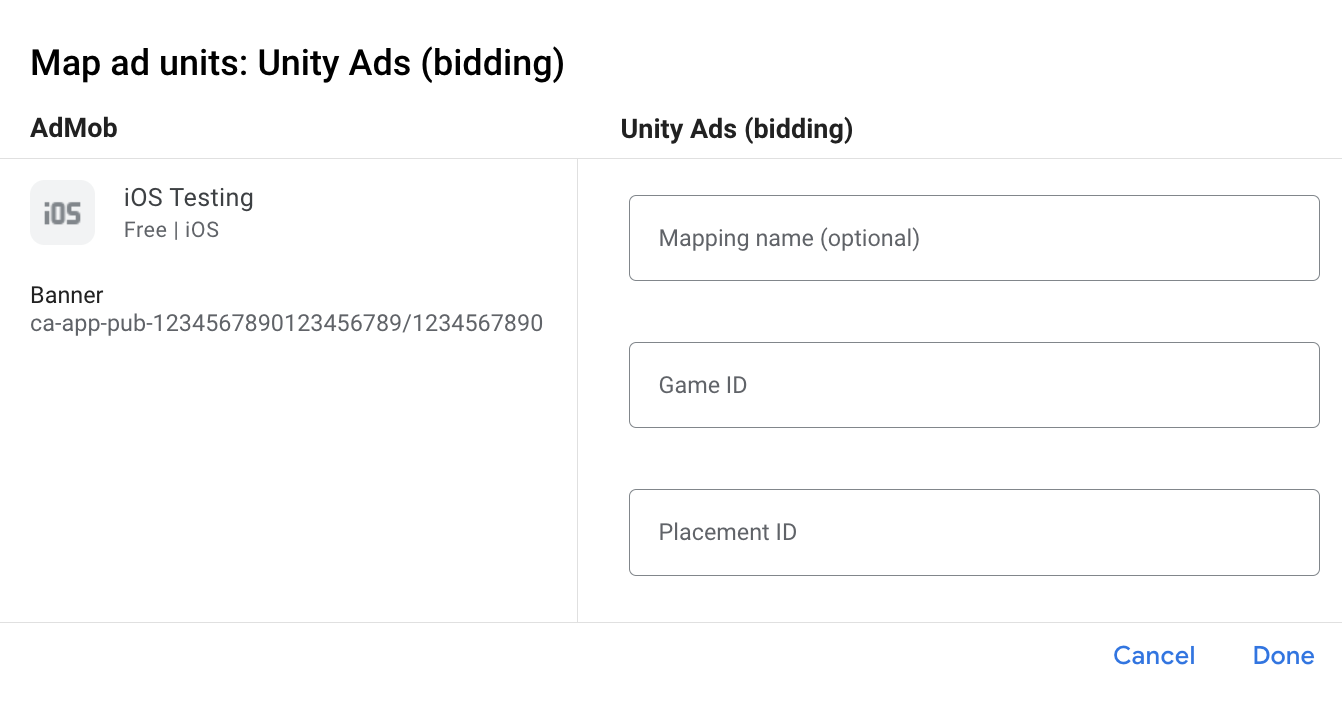
Waterfall
Under the Waterfall card in the Ad Sources section, select Add Ad Source. Then select Unity Ads.
Select Unity Ads and enable the Optimize switch. Enter the API Key and Organization core ID obtained in the previous section to set up ad source optimization for Unity Ads. Then enter an eCPM value for Unity Ads and click Continue.
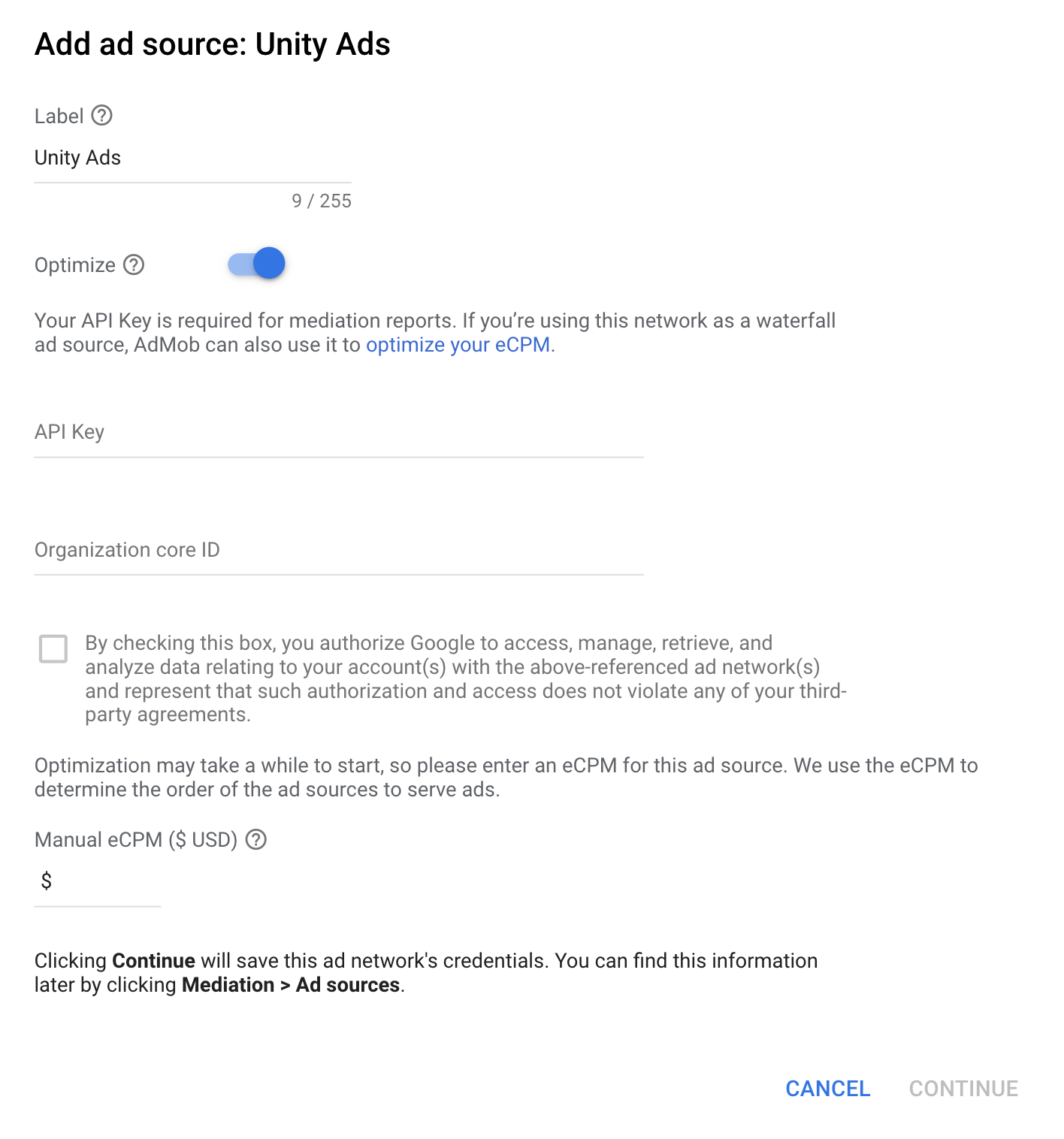
If you already have a mapping for Unity Ads, you can select it. Otherwise, click Add mapping.
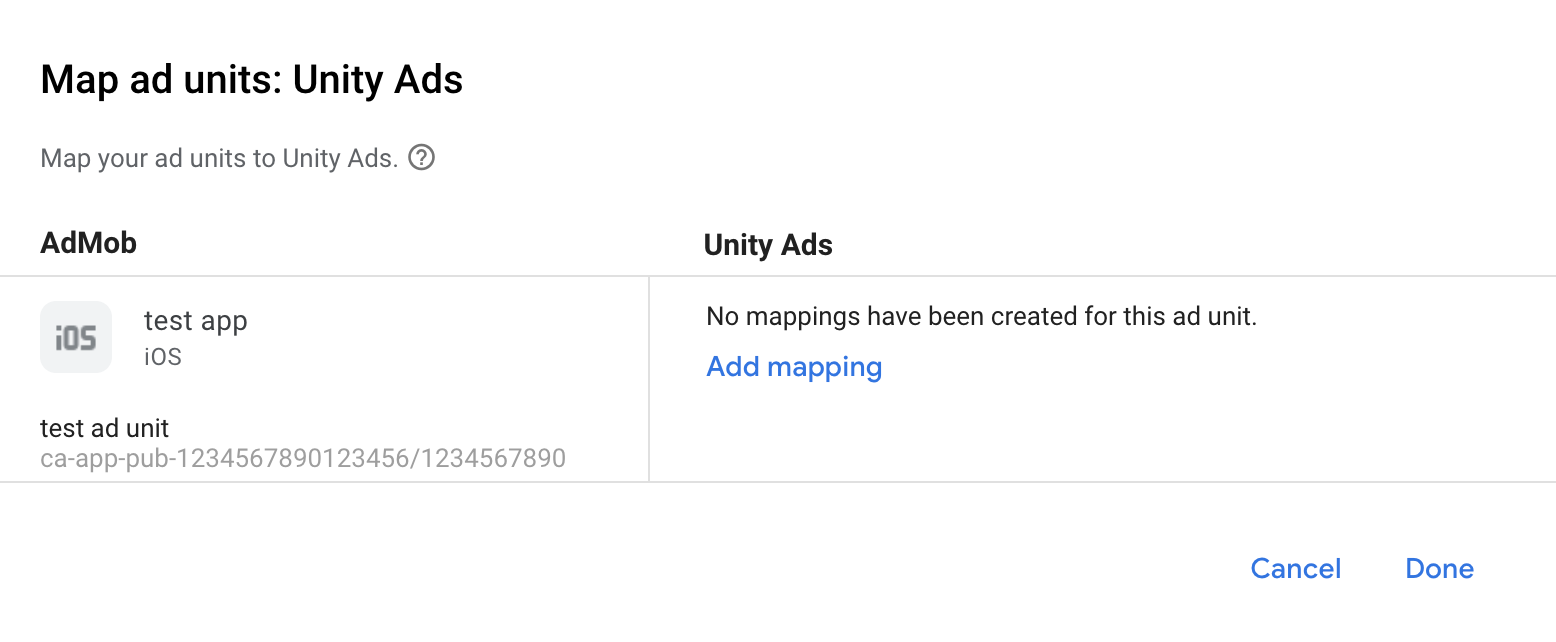
Next, enter the Game ID and Placement ID obtained in the previous section. Then click Done.
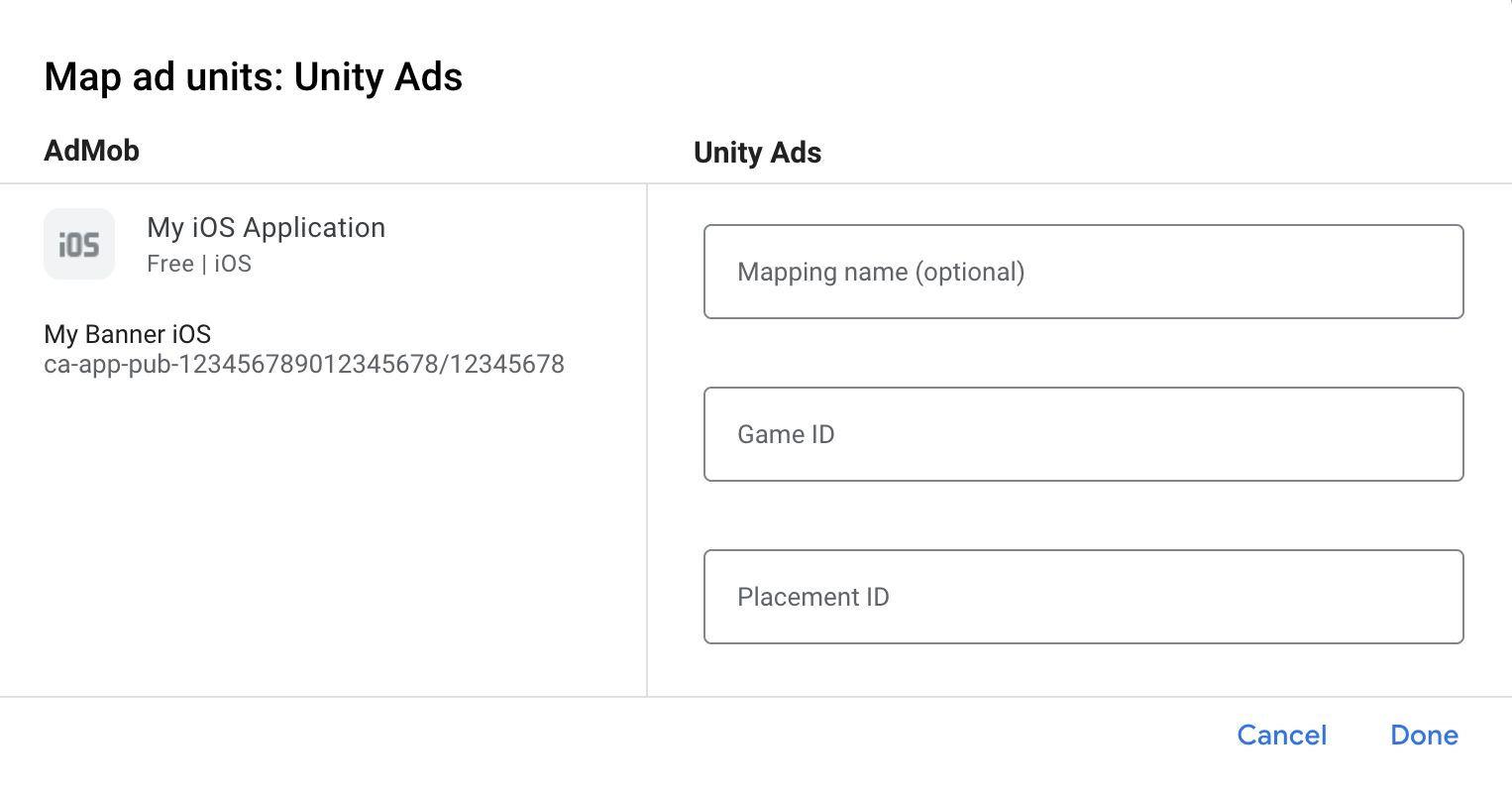
Add Unity Ads to GDPR and US state regulations ad partners list
Follow the steps in GDPR settings and US state regulations settings to add Unity Ads to the GDPR and US state regulations ad partners list in the AdMob UI.
Step 3: Import the Unity Ads SDK and adapter
Using CocoaPods (recommended)
Add the following line to your project's Podfile:
pod 'GoogleMobileAdsMediationUnity'From the command line run:
pod install --repo-update
Manual integration
Download the latest version of the Unity Ads SDK, and link UnityAds.framework in your project.
Download the latest version of the Unity Ads adapter from the download link in the Changelog and link UnityAdapter.framework in your project.
Step 4: Implement privacy settings on Unity Ads SDK
EU consent and GDPR
Under the Google EU User Consent Policy, you must ensure that certain disclosures are given to, and consents obtained from, users in the European Economic Area (EEA) regarding the use of device identifiers and personal data. This policy reflects the requirements of the EU ePrivacy Directive and the General Data Protection Regulation (GDPR). When seeking consent, you must identify each ad network in your mediation chain that may collect, receive, or use personal data and provide information about each network's use. Google currently is unable to pass the user's consent choice to such networks automatically.
In SDK version 2.0.0, Unity Ads added an API to support privacy settings. The following sample code shows how to pass this consent information to the Unity Ads SDK. Should you choose to pass consent information to the Unity Ads SDK manually, it is recommended that this code is called prior to requesting ads through the Google Mobile Ads SDK.
Swift
import UnityAds
// ...
let gdprMetaData = UADSMetaData()
gdprMetaData.set("gdpr.consent", value: true)
gdprMetaData.commit()
Objective-C
#import <UnityAds/UnityAds.h>
// ...
UADSMetaData *gdprMetaData = [[UADSMetaData alloc] init];
[gdprMetaData set:@"gdpr.consent" value:@YES];
[gdprMetaData commit];
See Unity Ads' Privacy Consent and data APIs and Complying with GDPR guides for more details and the values that can be provided in each method.
US states privacy laws
U.S. states privacy laws require giving users the right to opt out of the "sale" of their "personal information" (as the law defines those terms), with the opt-out offered via a prominent "Do Not Sell My Personal Information" link on the "selling" party's homepage. The U.S. states privacy laws compliance guide offers the ability to enable restricted data processing for Google ad serving, but Google is unable to apply this setting to each ad network in your mediation chain. Therefore, you must identify each ad network in your mediation chain that may participate in the sale of personal information and follow guidance from each of those networks to ensure compliance.
In SDK version 2.0.0, Unity Ads added an API to support privacy settings. The following sample code shows how to pass this consent information to the Unity Ads SDK. Should you choose to pass consent information to the Unity Ads SDK manually, it is recommended that this code is called prior to requesting ads through the Google Mobile Ads SDK.
Swift
import UnityAds
// ...
let ccpaMetaData = UADSMetaData()
ccpaMetaData.set("privacy.consent", value: true)
ccpaMetaData.commit()
Objective-C
#import <UnityAds/UnityAds.h>
// ...
UADSMetaData *ccpaMetaData = [[UADSMetaData alloc] init];
[ccpaMetaData set:@"privacy.consent" value:@YES];
[ccpaMetaData commit];
See Unity Ads' Privacy Consent and data APIs and Complying with CCPA guides for more details and the values that can be provided in each method.
Step 5: Add required code
SKAdNetwork integration
Follow Unity Ads's documentation
to add the SKAdNetwork identifiers to your project's Info.plist file.
Compile errors
Swift
No additional code is required for Swift integrations.
Objective-C
For Unity Ads adapter 4.4.0.0 or higher, you must follow the integration steps in the Unity documentation.
Step 6: Test your implementation
Enable test ads
Make sure you register your test device for AdMob and enable test mode in Unity Ads UI.
Verify test ads
To verify that you are receiving test ads from Unity Ads, enable single ad source testing in ad inspector using the Unity Ads (Bidding) and Unity Ads (Waterfall) ad source(s).
Error codes
If the adapter fails to receive an ad from Unity Ads,
publishers can check the underlying error from the ad response using
GADResponseInfo.adNetworkInfoArray
under the following classes:
GADMAdapterUnity
GADMediationAdapterUnity
Here are the codes and accompanying messages thrown by the UnityAds adapter when an ad fails to load:
| Error code | Reason |
|---|---|
| 0-9 | UnityAds SDK returned an error. See Unity's documentation for more details. |
| 101 | UnityAds server parameters configured in the AdMob UI are missing/invalid. |
| 102 | Device not supported by UnityAds. |
| 103 | UnityAds finished presenting with error state kUnityAdsFinishStateError. |
| 104 | The Unity ad object is nil after calling its initializer. |
| 105 | Failed to show Unity Ads due to ad not ready. |
| 106 | UnityAds called a placement changed callback with placement state kUnityAdsPlacementStateNoFill. |
| 107 | UnityAds called a placement changed callback with placement state kUnityAdsPlacementStateDisabled. |
| 108 | An ad was already loaded for this placement. UnityAds SDK does not support loading multiple ads for the same placement. |
Unity Ads iOS Mediation Adapter Changelog
Version 4.12.5.0
- Verified compatibility with Unity Ads SDK 4.12.5.
Built and tested with:
- Google Mobile Ads SDK version 11.12.0.
- Unity Ads SDK version 4.12.5.
Version 4.12.4.0
- Verified compatibility with Unity Ads SDK 4.12.4.
Built and tested with:
- Google Mobile Ads SDK version 11.12.0.
- Unity Ads SDK version 4.12.4.
Version 4.12.3.1
- Updated
CFBundleShortVersionStringto have three components instead of four.
Built and tested with:
- Google Mobile Ads SDK version 11.10.0.
- Unity Ads SDK version 4.12.3.
Version 4.12.3.0
- Verified compatibility with Unity Ads SDK 4.12.3.
Built and tested with:
- Google Mobile Ads SDK version 11.10.0.
- Unity Ads SDK version 4.12.3.
Version 4.12.2.0
- Verified compatibility with Unity Ads SDK 4.12.2.
Built and tested with:
- Google Mobile Ads SDK version 11.7.0.
- Unity Ads SDK version 4.12.2.
Version 4.12.1.0
- Verified compatibility with Unity Ads SDK 4.12.1.
Built and tested with:
- Google Mobile Ads SDK version 11.6.0.
- Unity Ads SDK version 4.12.1.
Version 4.12.0.0
- Verified compatibility with Unity Ads SDK 4.12.0.
Built and tested with:
- Google Mobile Ads SDK version 11.5.0.
- Unity Ads SDK version 4.12.0.
Version 4.11.3.1
- Added bidding support for banner, interstitial and rewarded ad formats.
Built and tested with:
- Google Mobile Ads SDK version 11.5.0.
- Unity Ads SDK version 4.11.3.
Version 4.11.3.0
- Verified compatibility with Unity Ads SDK 4.11.3.
Built and tested with:
- Google Mobile Ads SDK version 11.4.0.
- Unity Ads SDK version 4.11.3.
Version 4.11.2.0
- Verified compatibility with Unity Ads SDK 4.11.2.
Built and tested with:
- Google Mobile Ads SDK version 11.4.0.
- Unity Ads SDK version 4.11.2.
Version 4.10.0.0
- Verified compatibility with Unity Ads SDK 4.10.0.
Built and tested with:
- Google Mobile Ads SDK version 11.2.0.
- Unity Ads SDK version 4.10.0.
Version 4.9.3.0
- Verified compatibility with Unity Ads SDK 4.9.3.
- Now requires minimum iOS version 12.0.
- Now requires Google Mobile Ads SDK version 11.0 or higher.
- Included
Info.plistin the frameworks withinUnityAdapter.xcframework.
Built and tested with:
- Google Mobile Ads SDK version 11.0.1.
- Unity Ads SDK version 4.9.3.
Version 4.9.2.0
- Verified compatibility with Unity Ads SDK 4.9.2.
Built and tested with:
- Google Mobile Ads SDK version 10.13.0.
- Unity Ads SDK version 4.9.2.
Version 4.9.1.0
- Verified compatibility with Unity Ads SDK 4.9.1.
Built and tested with:
- Google Mobile Ads SDK version 10.12.0.
- Unity Ads SDK version 4.9.1.
Version 4.9.0.0
- Removed
GADMAdNetworkAdapterconformance and dependency from the Unity adapter. - Added report impression method invocation in
unityAdsShowStartdelegate method. - Verified compatibility with Unity Ads SDK 4.9.0.
Built and tested with:
- Google Mobile Ads SDK version 10.12.0.
- Unity Ads SDK version 4.9.0.
Version 4.8.0.0
- Added support for impression events for banner ads.
- Verified compatibility with Unity Ads SDK 4.8.0.
Built and tested with:
- Google Mobile Ads SDK version 10.7.0.
- Unity Ads SDK version 4.8.0.
Version 4.7.1.0
- Verified compatibility with Unity Ads SDK 4.7.1.
Built and tested with:
- Google Mobile Ads SDK version 10.5.0.
- Unity Ads SDK version 4.7.1.
Version 4.7.0.0
- Verified compatibility with Unity Ads SDK 4.7.0.
- Now requires minimum iOS version 11.0.
- Now requires Google Mobile Ads SDK version 10.4.0 or higher.
Built and tested with:
- Google Mobile Ads SDK version 10.4.0.
- Unity Ads SDK version 4.7.0.
Version 4.6.1.0
- Verified compatibility with Unity Ads SDK 4.6.1.
Built and tested with:
- Google Mobile Ads SDK version 10.2.0.
- Unity Ads SDK version 4.6.1.
Version 4.6.0.0
- Verified compatibility with Unity Ads SDK 4.6.0.
- Added support for forwarding COPPA information to the Unity Ads SDK.
- Removed support for the
armv7architecture. - Now requires Google Mobile Ads SDK version 10.0.0 or higher.
Built and tested with:
- Google Mobile Ads SDK version 10.2.0.
- Unity Ads SDK version 4.6.0.
Version 4.5.0.0
- Verified compatibility with Unity Ads SDK 4.5.0.
Built and tested with:
- Google Mobile Ads SDK version 9.14.0.
- Unity Ads SDK version 4.5.0.
Version 4.4.1.0
- Verified compatibility with Unity Ads SDK 4.4.1.
Built and tested with:
- Google Mobile Ads SDK version 9.11.0.
- Unity Ads SDK version 4.4.1.
Version 4.4.0.0
- Updated the adapter to use the
didRewardUserAPI. - Now requires Google Mobile Ads SDK version 9.8.0 or higher.
- Verified compatibility with Unity Ads SDK 4.4.0.
Built and tested with:
- Google Mobile Ads SDK version 9.10.0.
- Unity Ads SDK version 4.4.0.
Version 4.3.0.0
- Verified compatibility with Unity Ads SDK 4.3.0.
Built and tested with:
- Google Mobile Ads SDK version 9.8.0.
- Unity Ads SDK version 4.3.0.
Version 4.2.1.0
- Verified compatibility with Unity Ads SDK 4.2.1.
Built and tested with:
- Google Mobile Ads SDK version 9.4.0.
- Unity Ads SDK version 4.2.1.
Version 4.1.0.0
- Verified compatibility with Unity Ads SDK 4.1.0.
Built and tested with:
- Google Mobile Ads SDK version 9.2.0.
- Unity Ads SDK version 4.1.0.
Version 4.0.1.0
- Verified compatibility with Unity Ads SDK 4.0.1.
Built and tested with:
- Google Mobile Ads SDK version 9.0.0.
- Unity Ads SDK version 4.0.1.
Version 4.0.0.2
- Added support for the arm64 simulator architecture.
Built and tested with:
- Google Mobile Ads SDK version 9.0.0.
- Unity Ads SDK version 4.0.0.
Version 4.0.0.1
- Verified compatibility with Google Mobile Ads SDK version 9.0.0.
- Now requires Google Mobile Ads SDK version 9.0.0 or higher.
Built and tested with:
- Google Mobile Ads SDK version 9.0.0.
- Unity Ads SDK version 4.0.0.
Version 4.0.0.0
- Verified compatibility with Unity Ads SDK 4.0.0.
- Now requires minimum iOS version 10.0.
Built and tested with
- Google Mobile Ads SDK version 8.13.0.
- Unity Ads SDK version 4.0.0.
Version 3.7.5.0
- Verified compatibility with Unity Ads SDK 3.7.5.
Built and tested with
- Google Mobile Ads SDK version 8.8.0.
- Unity Ads SDK version 3.7.5.
Version 3.7.4.0
- Verified compatibility with Unity Ads SDK 3.7.4.
Built and tested with
- Google Mobile Ads SDK version 8.7.0.
- Unity Ads SDK version 3.7.4.
Version 3.7.2.0
- Verified compatibility with Unity Ads SDK 3.7.2.
- Relaxed dependency to Google Mobile Ads SDK version 8.0.0 or higher.
Built and tested with
- Google Mobile Ads SDK version 8.5.0.
- Unity Ads SDK version 3.7.2.
Version 3.7.1.0
- Verified compatibility with Unity Ads SDK 3.7.1.
- Now requires Google Mobile Ads SDK version 8.4.0 or higher.
Built and tested with
- Google Mobile Ads SDK version 8.4.0.
- Unity Ads SDK version 3.7.1.
Version 3.6.2.0
- Updated the adapter to use the
.xcframeworkformat. - Verified compatibility with Unity Ads SDK 3.6.2.
- Now requires Google Mobile Ads SDK version 8.2.0 or higher.
Built and tested with
- Google Mobile Ads SDK version 8.2.0.
- Unity Ads SDK version 3.6.2.
Version 3.6.0.0
- Verified compatibility with Unity Ads SDK 3.6.0.
- Now requires Google Mobile Ads SDK version 7.69.0 or higher.
Built and tested with
- Google Mobile Ads SDK version 7.69.0.
- Unity Ads SDK version 3.6.0.
Version 3.5.1.1
- Fixed a crash that sometimes occurred when the Unity Ads SDK finished initializing.
Built and tested with
- Google Mobile Ads SDK version 7.68.0.
- Unity Ads SDK version 3.5.1.
Version 3.5.1.0
- Verified compatibility with Unity Ads SDK 3.5.1.
Built and tested with
- Google Mobile Ads SDK version 7.68.0.
- Unity Ads SDK version 3.5.1.
Version 3.5.0.0
- Verified compatibility with Unity Ads SDK 3.5.0.
- Added support for Adaptive Banner ads.
- Now requires Google Mobile Ads SDK version 7.68.0 or higher.
Built and tested with
- Google Mobile Ads SDK version 7.68.0.
- Unity Ads SDK version 3.5.0.
Version 3.4.8.0
- Verified compatibility with Unity Ads SDK 3.4.8.
- Now requires Google Mobile Ads SDK version 7.63.0 or higher.
Built and tested with
- Google Mobile Ads SDK version 7.63.0.
- Unity Ads SDK version 3.4.8.
Version 3.4.6.0
- Verified compatibility with Unity Ads SDK 3.4.6.
- Now requires Google Mobile Ads SDK version 7.60.0 or higher.
Built and tested with
- Google Mobile Ads SDK version 7.60.0.
- Unity Ads SDK version 3.4.6.
Version 3.4.2.2
- Added standardized adapter error codes and messages.
- Updated the minimum required Google Mobile Ads SDK version to 7.59.0.
Built and tested with
- Google Mobile Ads SDK version 7.59.0.
- Unity Ads SDK version 3.4.2.
Version 3.4.2.1
- Improved forwarding of Unity's errors to recognize initialization and ad load failures earlier and reduce timeouts.
- Removed support for the i386 architecture.
Built and tested with
- Google Mobile Ads SDK version 7.57.0.
- Unity Ads SDK version 3.4.2.
Version 3.4.2.0
- Verified compatibility with Unity Ads SDK 3.4.2.
Built and tested with
- Google Mobile Ads SDK version 7.55.1.
- Unity Ads SDK version 3.4.2.
Version 3.4.0.0
- Verified compatibility with Unity Ads SDK 3.4.0.
- Now supports loading multiple banner ads at once.
Built and tested with
- Google Mobile Ads SDK version 7.53.0.
- Unity Ads SDK version 3.4.0.
Version 3.3.0.0
- Verified compatibility with Unity Ads SDK 3.3.0.
- Now supports loading multiple banner ads at once.
Built and tested with
- Google Mobile Ads SDK version 7.51.0.
- Unity Ads SDK version 3.3.0.
Version 3.2.0.1
- Verified compatibility with Unity Ads SDK 3.2.0.
- Now requires Google Mobile Ads SDK version 7.46.0 or higher.
- Fixed an issue where Unity Banner ads would fail to show when loaded.
- Fixed an issue where the adapter was not properly forwarding the
unityAdsReadycallback.
Version 3.2.0.0
- Release was removed due to a regression on no-fill reporting.
Version 3.1.0.0
- Verified compatibility with Unity Ads SDK 3.1.0.
Version 3.0.3.0
- Verified compatibility with Unity Ads SDK 3.0.3.
- Now requires Google Mobile Ads SDK version 7.42.2 or higher.
- Added support for flexible banner ad sizes.
- Fixed an issue where Unity Banner ads would only successfully load once per session.
Version 3.0.1.0
- Verified compatibility with Unity Ads SDK 3.0.1.
- Fixed a crash that occurred when deallocating rewarded ads.
Version 3.0.0.3
- Updating adapter to use new rewarded API.
- Now requires Google Mobile Ads SDK version 7.41.0 or higher.
Version 3.0.0.2
- Added support for banner ads.
Version 3.0.0.1
- Fixed an issue where the adapter stores the 'placementId' of previous request.
Version 3.0.0.0
- Verified compatibility with Unity Ads SDK 3.0.0.
Version 2.3.0.0
- Verified compatibility with Unity Ads SDK 2.3.0.
Version 2.2.1.1
- Added
adapterDidCompletePlayingRewardBasedVideoAd:callback to the adapter.
Version 2.2.1.0
- Verified compatibility with Unity Ads SDK 2.2.1.
Version 2.2.0.0
- Verified compatibility with Unity Ads SDK 2.2.0.
Version 2.1.2.0
- Verified compatibility with Unity Ads SDK 2.1.2.
- Removed the support for 'armv7s' architecture.
Version 2.1.1.0
- Verified compatibility with Unity Ads SDK 2.1.1.
Version 2.1.0.0
- Updated the adapter to make it compatible with Unity Ads SDK 2.1.0.
Version 2.0.8.0
- Verified compatibility with Unity Ads SDK 2.0.8.
Version 2.0.7.0
- Adapter now tracks Unity Ads clicks so the AdMob and the Unity Ads click statistics can match up.
- Apps now get
interstitialWillLeaveApplication:andrewardBasedVideoAdWillLeaveApplication:callbacks.
Version 2.0.6.0
- Verified compatibility with Unity Ads SDK 2.0.6.
Version 2.0.5.0
- Verified compatibility with Unity Ads SDK 2.0.5.
Version 2.0.4.0
- Changed the version naming system to [Unity Ads SDK version].[adapter patch version].
- Updated the minimum required Unity Ads SDK to v2.0.4.
- Updated the minimum required Google Mobile Ads SDK to v7.10.1.
Version 1.0.2
- Made the user reward item's key non nil. The reward key will always be an empty or a valid string.
Version 1.0.1
- Fixed bug where the
rewardBasedVideoAdDidOpen:callback wasn’t getting called.
Version 1.0.0
- Supports interstitial and reward-based video ads.